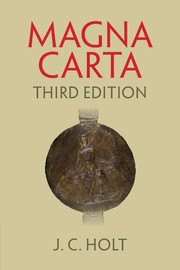Book contents
- Frontmatter
- Dedication
- Contents
- List of plates
- Preface to third edition
- Preface to second edition
- Preface to first edition
- Acknowledgements
- Abbreviations
- Introduction
- 1 The Charter and its history
- 2 Government and society in the twelfth century
- 3 Privilege and liberties
- 4 Custom and law
- 5 Justice and jurisdiction
- 6 Crisis and civil war
- 7 Quasi Pax
- 8 The quality of the Great Charter
- 9 The achievement of 1215
- 10 From distraint to war
- 11 The re-issues and the beginning of the myth
- Appendices
- 1 The meeting at Bury St Edmunds, 1214
- 2 Notification of Thomas count of Perche, February 1215
- 3 Triplex forma pacis
- 4 The ‘unknown’ charter
- 5 The Articles of the Barons
- 6 Magna Carta, 1215
- 7 Translations of the Charters
- 8 The Twenty-Five barons of Magna Carta, 1215
- 9 The date of the London treaty
- 10 The Oxford Council, 16–23 July 1215
- 11 Select documents illustrative of the history of Magna Carta, 1215
- 12 Magna Carta, 1225
- 13 Charter of the Forest, 1225
- 14 Liberties and perpetuity
- References
- Index
- Plate section
2 - Notification of Thomas count of Perche, February 1215
from Appendices
Published online by Cambridge University Press: 05 July 2015
- Frontmatter
- Dedication
- Contents
- List of plates
- Preface to third edition
- Preface to second edition
- Preface to first edition
- Acknowledgements
- Abbreviations
- Introduction
- 1 The Charter and its history
- 2 Government and society in the twelfth century
- 3 Privilege and liberties
- 4 Custom and law
- 5 Justice and jurisdiction
- 6 Crisis and civil war
- 7 Quasi Pax
- 8 The quality of the Great Charter
- 9 The achievement of 1215
- 10 From distraint to war
- 11 The re-issues and the beginning of the myth
- Appendices
- 1 The meeting at Bury St Edmunds, 1214
- 2 Notification of Thomas count of Perche, February 1215
- 3 Triplex forma pacis
- 4 The ‘unknown’ charter
- 5 The Articles of the Barons
- 6 Magna Carta, 1215
- 7 Translations of the Charters
- 8 The Twenty-Five barons of Magna Carta, 1215
- 9 The date of the London treaty
- 10 The Oxford Council, 16–23 July 1215
- 11 Select documents illustrative of the history of Magna Carta, 1215
- 12 Magna Carta, 1225
- 13 Charter of the Forest, 1225
- 14 Liberties and perpetuity
- References
- Index
- Plate section
Summary
The letter printed below was issued by Thomas count of Perche on behalf of his knights of the castlery of Bellême. It specifies four occasions for the feudal aid: the count's first knighting, his first ransom, the knighting of his eldest son and the marriage of his eldest daughter. It is also of great interest in its language. The aids are described as tallia (tailles or tallages) levied both on knights and their men; and it provides a rare instance of the adverb feodaliter, here used synonymously with ‘lawfully’.
Thomas accompanied Prince Louis to England and was killed at the battle of Lincoln in 1217, the subject of a famous drawing by Matthew Paris.
Thomas comes Pertici omnibus ad quos presentes littere pervenerint salutem in domino. Ad universorum noticiam volumus pervenire quod milites nostri de castellario Beilim' talliam de feodis suis et hominibus suis nobis debent tantummodo feodaliter pro hiis quatuor rebus que sequuntur: pro prima milicia nostra; pro prima captione nostra de guerra; pro milicia filii nostri primogeniti viventis; et pro prima filia nostra maritanda. Preter has tallias nec a militum feodis nec ab eorum hominibus tallias possumus feodaliter extorquere, et ne hujusmodi libertas ab aliquo heredum nostrorum in posterum infringatur, eam sigilli nostril caractere fecimus conmuniri. Actum anno gracie M cc quartodecimo mense februario.
- Type
- Chapter
- Information
- Magna Carta , pp. 340Publisher: Cambridge University PressPrint publication year: 2015



